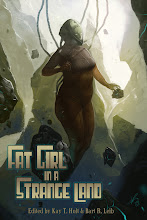Today I’d like to introduce you
to Catherine Schaff-Stump, one of my fellow writers from the Taos Toolbox
workshop I attended last summer.
Catherine is a fantastic
speculative fiction writer who tends to write for younger ages. She interviewed
every member of our workshop class (which you can find here) and now
it’s time to return the favor.
1. When
did you know you wanted to be a writer?
My older brother is an artist,
so I knew that couldn’t be my thing, because then I would be a copy cat. One
year, he painted a beautiful bird on a block of wood for my mother for mother’s
day, and I whipped out a small (and somewhat maudlin, I’m pretty sure!) poem
which he calligraphied underneath the bird. My mother gave me a great deal of
praise, and that’s when I knew that this was something unique that I could do.
So I began to write stories.
2. How
would you describe your writing?
I do two kinds of things: kind
of a madcap middle grade kind of thing (like in Hulk Hercules) and kind of a
darker, gothic kind of thing. I’m a Gemini, right? There’s a fundamental
dichotomy in my character.
3. How
much research do you do for your work?
A LOT. I’m a former graduate
student, so I’m not proud. I like to research and try to get things closer to
what they might be like. Even when I’m making something up, I like to do some
real world research as a basis for beginning.
4. What
are you working on right now?
I have finally begun the first
of five books about a family of demon binders, so right now I’m writing about
two fairly quixotic sisters and their struggle for power and romance. There is
at least one nice guy in the book. Awful things will happen to everyone.
Somehow I find that satisfying. :P
5. How
did you come to apply for Taos Toolbox?
I’d been to Viable Paradise,
and that gave me some faith in my ability to make it in the writing game, but I
thought I need to push myself further than that to make it professionally. I’d
been engaging in writer education—reading a lot, going to a couple of seminars,
and attending writer education sessions at cons. Many of my friends had been to
Taos, and thought it would be a good next step for me. So, I applied, and the
rest is history.
6. What
advice would you give to someone attending their first writing workshop?
Get used to criticism. Listen
and be gracious. Realize that someone else’s opinion may have insight for you,
but you must also trust your instincts. Try to treat your critique group as a
team, and you may have a great group of friends later. Lend a hand. Give good
crit. And remember, if you’re just
there for someone to tell you that your writing is great, you’re in the wrong
place, and you’ve wasted a whole lot of money. Be ready to learn.
7. What
is your writing goal for 10 years down the line?
In ten years, 2023, I will be
(da-dum!) 58. My hope would be to be
retired from my full time job as a college professor. I would like to then be a
full-time writer living on my retirement income in Florida. It would be awesome
if I even had published one or two novels already. I would still be half of one of the greatest romances of the 20th/21st
century. This sounds pretty idyllic.
8. Many
of your projects have series potential. Why do you think that is?
Because my brain keeps asking
what if. For example, the first Klarion
character started as a support character in another story, and he told me about
his family. And then I said, what were your parents like, and then your
grandparents? And where did the curse come from? And what do all the cosmological forces get out of all of this?
And…on and on. Just the other day, someone asked me a question about Carlo’s
granddad as I was sharing the book, and I thought crap. More what if.
I’ve never been a writer who’s
lacked material. I’ve always lacked time.
9. What
do you think is an important quality writers need to have if they are going to
succeed in this field?
Just one? Persistence. Through
the good times and the bad. Through the rejections and the apathy of sometimes
not wanting to write. Through the silent periods of agents and editors. Slog
on, little writer, slog on. The only way out is through.
I would also recommend a thick
skin; the recognition that you will sometimes be saddened and depressed by
constant rejection, and that’s okay; and a great support group of friends and
family that believe in your writing when you are not equipped to do so.
Remember, it’s not you. It’s
not them. It’s the right story in the right hands at the right time. Keep
writing until that happens.
10. Where can readers
find more of your work?
I am mostly in print these days. My middle-grade novel Hulk
Hercules: Professional Wrestler is available widely on line. You can find two
of my short stories, Turtle of the Earth and Mark Twain’s Daughter in
Cucurbital 2 and 3 respectively, and those are available through Paper Golem
press. If you’re very lucky, you might find a copy of the electronic Needles
and Bones which contains Sister Night, Sister Moon from Drollerie Press,
although that is now out of “print.”
Happy Writing!











